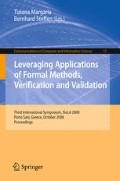Abstract
Educational modules can be seen as relevant mechanisms to improve the learning processes in general. The goal is to produce quality educational products, capable of motivating the learners and effectively contribute to their knowledge construction process. Despite their relevance, none of the initiatives to address the problem of creating educational modules considers a systematic process for developing them. The establishment of a well-defined set of guidelines and supporting mechanisms should ease the distributed and cooperative work to create, reuse and evolve educational modules, taking also into account the impact on the learning process. In this work we present a standardized process we have established aiming at creating well-designed, highly flexible and configurable educational modules. We focus on the aspects of process specialization and instantiation, illustrating the practical application of the instantiated process by the development of an educational module for teaching the fundamentals of software testing. Particularly, the availability of learning facilities, allied to the development of testing tools, should facilitate the apprenticeship of specific testing theories and skills, promoting better dissemination conditions to the practical evaluation and application of testing strategies, both in academic and industrial sets. The produced module has been applied and preliminarily evaluated in terms of the learning effectiveness. The results obtained give us some evidences on the practical use of the standard process as a supporting mechanism to the development of effective educational modules.
Access this chapter
Tax calculation will be finalised at checkout
Purchases are for personal use only
Preview
Unable to display preview. Download preview PDF.
References
Barbosa, E.F.: Uma Contribuição ao Processo de Desenvolvimento e Modelagem de Módulos Educacionais. PhD thesis, ICMC-USP, São Carlos, SP (March 2004) (in Portuguese)
Barbosa, E.F., Maldonado, J.C.: An integrated content modeling approach for educational modules. In: IFIP 19th World Computer Congress – International Conference on Education for the 21st Century, Santiago, Chile, pp. 17–26 (August 2006)
Barbosa, E.F., Maldonado, J.C.: Towards the establishment of a standard process for developing educational modules. In: 36th Annual Frontiers in Education Conference (FIE 2006), San Diego, CA, p. 6. CD-ROM (October 2006)
Barbosa, E.F., Silva, M.A.G., Corte, C.K.D., Maldonado, J.C.: Integrated teaching of programming foundations and software testing. In: 38th Annual Frontiers in Education Conference (FIE 2008), Saratoga Springs, NY, p. 6 (October 2008) (to appear)
Barbosa, E.F., Souza, S.R.S., Maldonado, J.C.: An experience on applying learning mechanisms for teaching inspection and software testing. In: 21st Conference on Software Engineering Education and Training (CSEET 2008), Charleston, SC, pp. 189–196 (April 2008)
Basili, V., Selby, R.W.: Comparing the Effectiveness of Software Testing Strategies. IEEE Transactions on Software Engineering SE-13(12), 1278–1296 (1987)
Brotherton, J.A., Abowd, G.D.: Lessons learned from eClass: Assessing automated capture and access in the classroom. ACM Transactions on Computer-Human Interaction 11(2), 121–155 (2004)
Chaim, M.L.: PokeTool – Uma ferramenta para suporte ao teste estrutural de programas baseado em análise de fluxo de dados. Master’s thesis, DCA/FEEC/UNICAMP, Campinas, SP (April 1991) (in Portuguse)
Delamaro, M.E., Maldonado, J.C., Mathur, A.P.: Interface mutation: An approach for integration testing. IEEE Transactions on Software Engineering 27(3), 228–247 (2001)
DeMillo, R.A., Lipton, R.J., Sayward, F.G.: Hints on test data selection: Help for the practicing programmer. IEEE Computer 11(4), 34–43 (1978)
Dick, W., Carey, L., Carey, J.O.: The Systematic Design of Instruction, 5th edn. Longman (2001)
Dieberger, A., Guzdial, M.: CoWeb – experiences with collaborative web spaces. In: Lueg, C., Fisher, D. (eds.) From Usenet to CoWebs: Interacting with Social Information Spaces. Springer, Heidelberg (2003)
Downes, S.: Learning objects: Resources for distance education worldwide. International Review of Research in Open and Distance Learning 2(1) (July 2001)
Edwards, S.H.: Improving student performance by evaluating how well students test their own programs. Journal on Educational Resources in Computing 3(3), 24 (2003)
Goldberg, M.W., Salari, S., Swoboda, P.: World Wide Web - Course Tool: An environment for building WWW-based courses. Computer Networks and ISDN Systems 28(7–11), 1219–1231 (1996)
IEEE Computer Society. Guide to the Software Engineering Body of Knowledge: Trial version (1.0) (May 2001), http://www.swebok.org/
IEEE Computer Society and Association for Computing Machinery. Computing Curricula – Computer Science Volume, Final Report (December 2001), http://www.computer.org/education/cc2001/
IEEE Learning Technology Standards Committee. Learning Object Metadata (LOM) (June 2002)
John, W.C., Toto, R., Lim, K.Y.: Introducing Tablet PCs: Initial results from the classroom. In: 36th Annual Frontiers in Education Conference (FIE 2006), San Diego, CA, p. 6. CD-ROM (October 2006)
Maidantchik, C.L.L., Rocha, A.R.: Managing a worldwide software process. In: Workshop on Global Software Development – International Conference on Software Engineering (ICSE 2002), Orlando, FL (May 2002)
Mayorga, J.I., Verdejo, M.F., Rodríguez-Artacho, M., Calero, M.Y.: Domain modelling to support educational web-based authoring. In: TET 1999 Congress, Norway (June 1999)
Moodle, D.G.: Moodle – a free, open source course management system for online learning (2006), http://moodle.org/
Schwabe, D., Rossi, G.: The object-oriented hypermedia design model. Communications of the ACM 38(8), 45–46 (1995)
Shepard, T., Lamb, M., Kelly, D.: More testing should be taught. Communications of the ACM 44(6), 103–108 (2001)
Simão, A.S., Ambrósio, A.M., Fabbri, S.C.P.F., Amaral, A.S., Martins, E., Maldonado, J.C.: Plavis/FSM: an environment to integrate FSM-based testing tools. In: XIX Simpósio Brasileiro de Engenharia de Software (SBES 2005) – Sessão de Ferramentas, Uberlândia, MG, pp. 1–6 (October 2005)
Turine, M.A.S., Oliveira, M.C.F., Masiero, P.C.: Designing structured hypertext with HMBS. In: VIII International ACM Hypertext Conference (Hypertext 1997), Southampton, UK, pp. 241–256 (April 1997)
Author information
Authors and Affiliations
Editor information
Editors and Affiliations
Rights and permissions
Copyright information
© 2008 Springer-Verlag Berlin Heidelberg
About this paper
Cite this paper
Barbosa, E.F., Maldonado, J.C. (2008). Specialization and Instantiation Aspects of a Standard Process for Developing Educational Modules. In: Margaria, T., Steffen, B. (eds) Leveraging Applications of Formal Methods, Verification and Validation. ISoLA 2008. Communications in Computer and Information Science, vol 17. Springer, Berlin, Heidelberg. https://doi.org/10.1007/978-3-540-88479-8_36
Download citation
DOI: https://doi.org/10.1007/978-3-540-88479-8_36
Publisher Name: Springer, Berlin, Heidelberg
Print ISBN: 978-3-540-88478-1
Online ISBN: 978-3-540-88479-8
eBook Packages: Computer ScienceComputer Science (R0)

